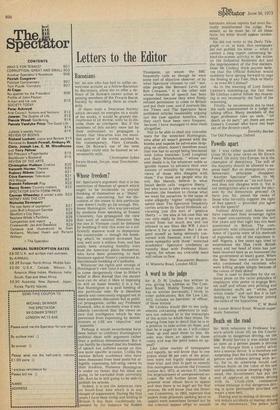Whose freedom?
Sir: Spectator's argument that it is the restriction of freedom of speech which ought to be intolerable to anyone thinking of themselves as a ' liberal ' may seem convincing, but his discussion of the issues in this particular case doesn't really go far enough. Professor Huntington, who was prevented by students from speaking at Sussex University, has propagated the view that wars of national liberation like the one in Vietnam could be defeated by bombing if only this were on a sufficiently massive scale to depopulate the countryside — though the bombing which he wanted increased has cost well over a million lives, and has lately been arousing hostility even from the American pilots themselves, who have been protesting to their Senators against Nixon's continued Indiscriminate bombing of Cambodia. Whatever the rights and wrongs of Huntington's view (and it seems to me to come dangerously close to Hitler's belief in Mein • Kampf that the master race can do what it likes in imposing its will on lesser breeds) it is a fact that Huntington is a paid hireling of one particular side. He is therefore openly and consciously engaged not in mere academic discussion but in political propaganda, unlike say Professor Eysenck, who is sincerely even if mistakenly convinced that the views on race and intelligence which he was prevented from expressing by demonstrators at LSE are 'objective ' and ' scientific '.
Perhaps it would nevertheless have been better to confront Huntington's political ideas with argument rather than a political demonstration. But it can hardly be claimed that his freedom of speech has suffered except on this one quite specific occasion. Unlike the various British academics who have been dismissed from their posts for allegedly expressing left-wing views to their students, Professor Huntington is under no threat that his ideas are going to be excluded from university life. And he is still going to be able to publish his articles.
Indeed, it is not the American view on South-East Asia which is in any danger of suppression. During the four years 1 have been living and writing in Britain it has been vociferously expressed by for instance Sir Robert Thompson, on whom the BBC frequently calls as though he were some sort of objective observer, or by what Spectator chooses to call "sensible people like Bernard Levin and Bob Conquest." It is the other side whose freedom of speech has been suppressed, because they were firmly refused permission to come to Britain and put their case; and if journals like the Times and The Spectator have published articles reasonably arguing out the case against America, then they can't have been very frequent, because I have managed to miss them: altogether.
Not to be able to shed any crocodile tears for the wretched Huntington, who after all wasn't greeted with the bombs and napalm he advocates dropping on others, doesn't therefore mean that one has to accept being bracketed with Julius Streicher, Lord Longford and Mary Whitehouse, "whose earnest desire it is, for whatever noble or ignoble reason to advance their own notions of morality by silencing the, views of those who disagree with them." For these are people who do not, like liberals, believe in what Isaiah Berlin calls 'negative liberty ', but who want to take away our actual freedom, the freedom to choose what we want for ourselves, in the name of some allegedly ' higher' religiously-inspired ideal. The Spectator frequently carries articles by David Holbrook advocating just this sort of ' positive fiberty ' — the idea in his case that we can only really be free if we are protected from too much sex and not allowed to see films like WR. I don't believe it for a moment. But I do regard myself as being seriously concerned with freedom, even if I have more sympathy with those 'wretched academics' Spectator condemns so roundly than with Professor Huntington, for whom my crocodile tears still refuse to flow.
Konstan tin Bazarov 41 Wisteria Road, London SE13


































 Previous page
Previous page